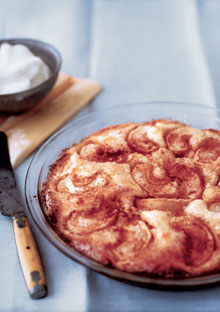
Photo: Tara Donne
Recipe—flour, fruit, a rolling pin. Reaction—swoons and cries for seconds.
My mother was a good cook and a great baker; her desserts were so delicious that my father and my older brother wrote a song about them, to the tune of Dvorák's Humoresque. It began, You may think us quite disgusting / We eat though our belly's busting / Mother, pass another piece of pie. As a child, I used to watch my mother in various long, narrow New York apartment kitchens shaping piecrusts with a rolling pin; taking rounds of dough wrapped in waxed paper out of the icebox and slicing them into cookies; pressing fruit into the top of my favorite dessert, a flat cake with apples, peaches, or plums . It was sweet and tart and buttery, infused with the flavor of its fruit. Like all her baking, it was emphatically homemade, and like the woman herself, it was unpretentious, without frills or tricks. She had learned to make it from her mother, who had learned it in Austria. She made it deftly, and she made it look simple. I could never get enough of it.
When I was young, I had no ambition to bake the cake myself. My mother did not school me in the womanly arts, not wanting me to be a housewife. "Never be financially dependent on a man," she would say to me darkly, alluding to my father, a tyrant in her eyes, whom she left and then returned to countless times in the course of a 70-year marriage. I was a daddy's girl. I wanted to grow up to be like my father, who was a literary man, and in many ways, that was what happened. I did not become a housewife, and the more I devoted myself to writing and editing, to literature, theater, art, and to friends who shared my interests, the less my mother and I seemed to have in common. We lived in different worlds.
Then some years ago, when I was in a reasonably stable relationship and feeling domestic, I asked her for the recipe . At that point, she had stopped baking. Because she had always done it by feel, she said, the recipe she wrote out for me might not be right. I knew less than nothing about baking—less than nothing because not only was I a novice but I assumed it would be easy. I tried the recipe the next time I had a dinner party, substituting whole wheat flour for white, to make it healthful. The one guest who commented at all said it tasted "very New England," by which I think he meant tasteless and mealy—if you had enough grit you could get it down. A few years later, a friend who knew how to bake tried several variations and her version didn't taste right, either. This fumbled passing of the recipe seemed symbolic of the lack of communication between my mother and me. I loved her but she was boring and irritating; I was so busy feeling superior, I failed to see that I bored and irritated her in turn.
Before my mother died, in 1997, we came to a rapprochement. Yet ten years later, I found myself musing too often about her affronts to me—and mine to her. I decided to try the cake again. It wasn't until I began breaking eggs and greasing pans that I realized that baking was an art, and my mother had been gifted. Nor had it occurred to me until then that her baking for us was a way of giving us love, but surely it was.
As I worked on the recipe, I imagined my mother peeling and slicing apples, melting butter in a double boiler, sifting flour. When she was baking, she concentrated—her eyes and fingers knew how to measure and mix the ingredients; when she was baking, her cares didn't matter—she relaxed; she became absorbed in the process and attuned to the ingredients—she knew what the cake required the way I know how to make a sentence say what it means. She was happy, doing her best, giving her all. She was anticipating the pleasure she would see in our faces as the cake came to the table and we devoured it.
I wish now that I'd thought more about how she was feeling when she was alive. I wish we hadn't been frozen on opposing sides of a false divide, and I had given her the respect and acknowledgment she deserved. I might have discovered a woman I'd never bothered to know—one who was too modest to think her expertise worth sharing, too shy to just say she loved us.
Still, if she had chosen to teach me baking, she could hardly have hit on a better method than giving me her sketch of a recipe. As I experimented, I found out that I couldn't bake blithely, the way I cook. I had to pay attention to the details, to follow directions, to work slowly and carefully. I adjusted the amount of sugar, the type of flour, the oven temperature, the baking time, the size of the pan. After a while, I could hardly remember what my mother's cake tasted like—but I always felt there was something wrong with my version: It was too coarse, it was too dry, the taste was off. Finally, I got the flavor right, but the consistency still wasn't what I remembered, so I went to Bruno Bakery in Greenwich Village to continue my research. My mother's cake had the texture of Bruno's apricot tart—or so I'd thought. When I took one home, its texture wasn't right, either. That was when I stopped searching, for I understood that my version of the cake was complete. It was time to let the past rest. I'd taken a half-forgotten recipe and made a good cake out of it. If my mother were still alive, she would be so pleased.




